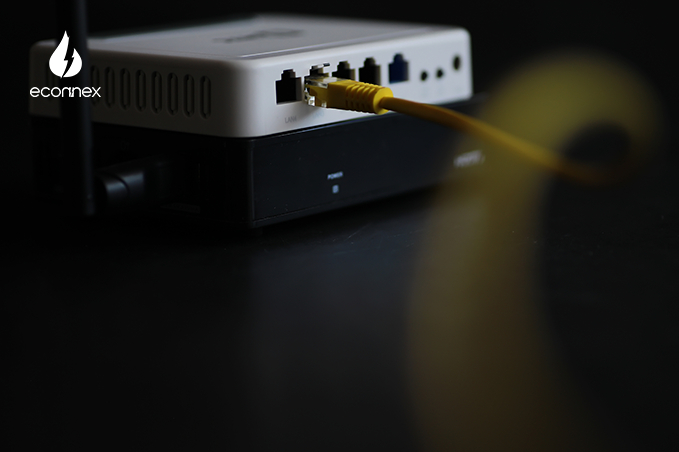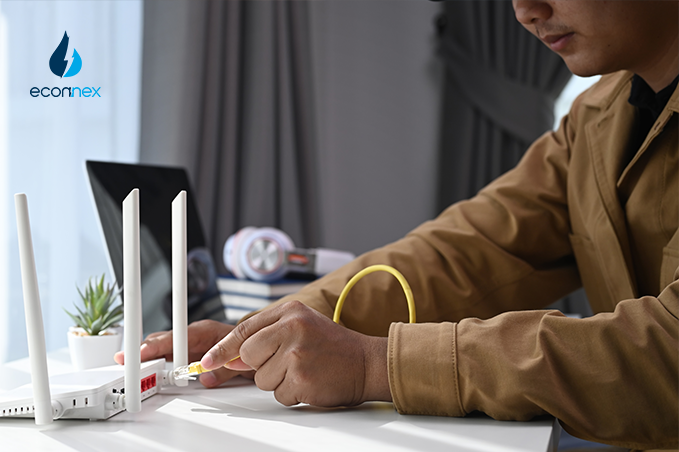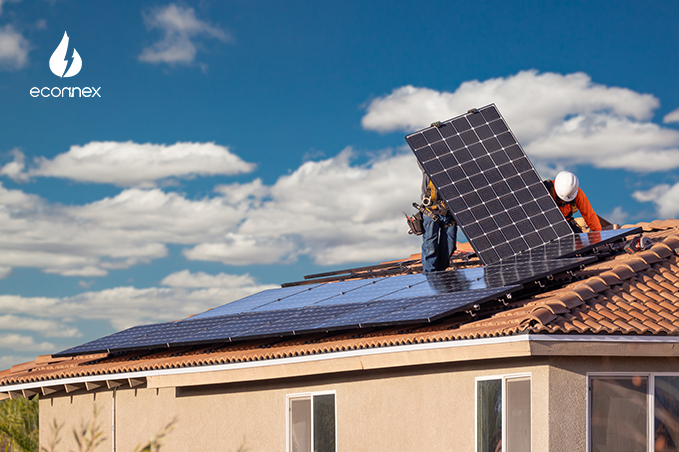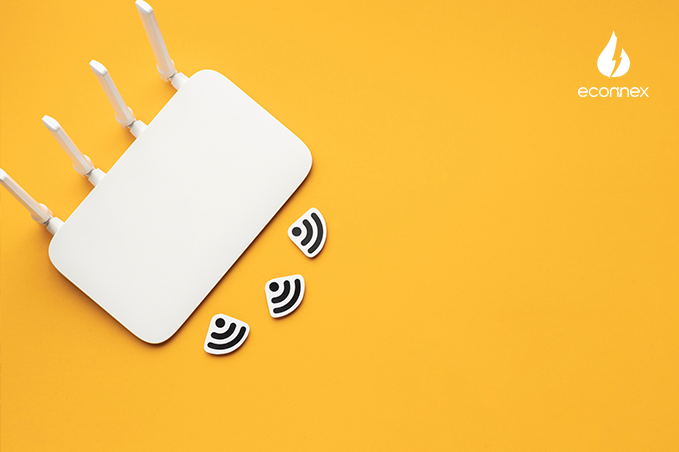Looking for the cheapest NBN 50 plan? Check out a detailed NBN guide covering various speed levels and budget-friendly options from providers. Learn how Econnex streamlines plan comparison and purchasing.

Published on 25/10/2023
By Parneet Kaur
NBN Comparison
In today's digital age, having a fast and reliable internet connection is essential. With the rollout of the National Broadband Network (NBN) in Australia, households have access to high-speed internet services. If you're looking for the cheapest NBN 50 plan, this guide is here to help. We will explain what the NBN is, discuss the different NBN speed tiers, explore the various NBN types, and provide a list of internet packages from different providers. Additionally, we will introduce you to Econnex NBN Comparison, a convenient platform that simplifies the process of comparing and purchasing internet plans online.
The National Broadband Network (NBN) is a government-owned initiative in Australia that aims to provide high-speed internet access to homes and businesses across the country. It involves the installation of a new network infrastructure that replaces the older copper-based telephone lines with optical fiber, satellite, or wireless connections.
The NBN is important because it offers several advantages over traditional internet connections. Firstly, it provides faster and more reliable internet speeds, allowing for seamless streaming, online gaming, video conferencing, and downloading large files. This improved connectivity enhances productivity, entertainment options, and overall user experience.
Check - Fastest Internet Provider in Your Area
Secondly, the NBN enables the delivery of advanced services such as high-definition television, telehealth, and smart home automation. These services rely on the increased bandwidth and stability of the NBN network, offering new possibilities for entertainment, healthcare, and convenience.
Lastly, the NBN is a crucial infrastructure for the future. As more devices become connected and data usage continues to grow, the NBN's capacity to handle high volumes of data is essential for supporting emerging technologies like virtual reality, artificial intelligence, and the Internet of Things (IoT).
Switching to the NBN brings several benefits for internet users:
a. Faster Internet Speeds: The NBN offers faster download and upload speeds compared to traditional ADSL connections. This means faster browsing, smoother streaming, quicker downloads, and reduced latency for online activities.
b. Improved Reliability: The NBN infrastructure is designed to provide a more stable and reliable internet connection. It reduces the likelihood of dropouts and interruptions, ensuring a consistent online experience.
c. Enhanced Multimedia Experience: With the NBN, you can enjoy high-definition video streaming, online gaming, and video conferencing without buffering or lag. It supports multiple devices simultaneously, catering to the needs of modern households.
d. Future-Proof Technology: The NBN is built to accommodate future advancements in technology and increasing data demands. Upgrading to the NBN ensures that your internet connection can support upcoming innovations and services.
e. Access to Advanced Services: The NBN enables access to services like high-quality telehealth, remote education, and smart home automation. These services require a stable and high-speed internet connection to function effectively.
The NBN differs from traditional internet connections, such as ADSL or cable, in several ways:
a. Network Infrastructure: The NBN replaces the aging copper-based infrastructure with optical fiber, satellite, or wireless connections. This modern network allows for faster and more reliable internet speeds compared to traditional technologies.
b. Speed Capabilities: The NBN offers different speed tiers, allowing users to choose the plan that best suits their needs. Traditional connections like ADSL have limited speed capabilities, making it challenging to achieve the same level of performance as the NBN.
c. Uploading Speeds: The NBN provides symmetrical upload and download speeds, meaning the upload speed is as fast as the download speed. Traditional connections often have slower upload speeds, which can affect activities like uploading files, video conferencing, and cloud-based services.
d. Network Coverage: The NBN aims to provide nationwide coverage, including remote and rural areas, ensuring that everyone has access to high-speed internet. Traditional connections may have limited coverage, especially in remote regions.
e. Future-Proofing: The NBN infrastructure is designed to accommodate future technological advancements and increasing data demands. Traditional connections may struggle to keep up with evolving technologies and the growing need for high-speed internet.
By understanding the differences between the NBN and traditional internet connections, users can make informed decisions about upgrading to the NBN and reaping the benefits of faster and more reliable internet access.
NBN speed tiers refer to the different download and upload speeds available on the National Broadband Network. These speed tiers are categorized based on their maximum download speeds, which indicate how quickly you can receive data from the internet. The upload speeds, although lower than download speeds, are still important for activities like video conferencing and uploading files.
The NBN offers four main speed tiers: Basic (NBN 12), Standard (NBN 25), Standard Plus (NBN 50), and Premium (NBN 100). Each speed tier provides a different level of performance and is priced accordingly. Understanding the different speed tiers can help you choose the one that best suits your internet usage requirements.
The NBN 50 speed tier is often considered the sweet spot for many households, offering a balance between affordability and performance. With a maximum download speed of up to 50 Mbps (megabits per second) and an upload speed of up to 20 Mbps, the NBN 50 tier provides a substantial increase in speed compared to lower tiers.
At 50 Mbps, you can enjoy smooth streaming of high-definition videos, online gaming with minimal lag, and fast file downloads. This speed tier is suitable for households with multiple users who engage in activities like streaming, gaming, video conferencing, and general web browsing simultaneously.
The NBN 50 tier strikes a good balance between cost and performance, making it a popular choice for those who require faster speeds but don't need the highest-tier options. It offers a reliable and efficient internet experience for most typical home internet usage scenarios.
When selecting the appropriate NBN speed tier for your needs, it's essential to consider the following factors:
a. Internet Usage: Assess how you and your household use the internet. Do you stream high-definition videos, play online games, or regularly download large files? Higher-speed tiers like NBN 50 may be more suitable for heavy internet usage, while lower tiers might suffice for lighter usage.
b. Number of Users: Consider the number of people using the internet simultaneously in your household. If you have multiple users engaging in data-intensive activities simultaneously, a higher speed tier like NBN 50 can ensure a smooth and uninterrupted online experience for everyone.
c. Budget: Evaluate your budget and determine how much you are willing to spend on your internet plan. Higher speed tiers usually come at a higher cost, so it's important to find a balance between performance and affordability.
d. Future Needs: Consider your future needs and potential growth in internet usage. If you anticipate an increase in demand for high-bandwidth activities or the addition of more connected devices, opting for a higher speed tier can provide room for future expansion.
By taking these factors into account, you can make an informed decision when choosing the right NBN speed tier for your requirements. Remember that while higher speed tiers offer faster performance, they may come at a higher price. Assess your specific needs and strike a balance between performance, affordability, and future growth.
Fibre to the Premises (FTTP) is considered the most advanced and reliable NBN connection type. With FTTP, a fibre optic cable is directly connected to your premises, delivering high-speed internet with consistent performance. This type of connection offers the fastest speeds and is capable of delivering NBN 1000 (Gigabit) speeds.
Fibre to the Node (FTTN) is a commonly used NBN connection type. In FTTN, fibre optic cables are connected to a street-side node, and the existing copper network is used to connect to your premises. The distance between your premises and the node can impact the speed and performance of your connection. FTTN can typically deliver speeds up to NBN 100.
Fibre to the Building (FTTB) is similar to FTTN, but instead of a node, fibre optic cables are connected to a central distribution point within an apartment building or a complex. From there, the existing copper or coaxial network is used to reach individual premises. FTTB can offer speeds up to NBN 100.
Hybrid Fibre Coaxial (HFC) utilizes a combination of fibre optic and coaxial cables. In HFC, fibre optic cables are used to connect to a local distribution point in the area, and from there, coaxial cables are used to connect to individual premises. HFC connections can provide high speeds, with typical plans offering speeds up to NBN 250.
Fixed Wireless NBN is designed for areas where it is not feasible to lay traditional cables. It utilizes wireless technology to connect to a nearby NBN tower, which then provides internet access to the premises through a fixed antenna. Fixed Wireless can offer speeds up to NBN 100, depending on the available network capacity.
Satellite NBN is designed for remote and rural areas where fixed-line connections are not viable. It relies on satellite technology to provide internet access. Satellite connections can provide speeds up to NBN 25, but they may have higher latency compared to other connection types due to the longer distance the signal must travel.
It's important to note that the availability of different NBN connection types can vary depending on your location. The type of connection you have will impact the speed and performance of your internet service. When choosing an NBN plan, it's crucial to consider both the speed tier and the type of connection available in your area to ensure you get the best possible internet experience.
When it comes to finding the most affordable NBN 50 plans, there are several internet service providers (ISPs) that offer competitive prices. Here are some of the cheapest NBN 50 plans available from different providers:
4.1 Exetel* ($53.95) Exetel offers a budget-friendly NBN 50 plan at $53.95 per month. With Exetel, you can enjoy reliable internet speeds at an affordable price point.
4.2 Superloop* ($59.00) Superloop provides an NBN 50 plan priced at $59.00 per month. Their plan offers competitive speeds and reliable connectivity.
4.3 Tangerine ($54.90) Tangerine offers an NBN 50 plan at $54.90 per month. They are known for their simple and affordable plans without compromising on quality.
4.4 More* ($53.00) More provides an NBN 50 plan priced at $53.00 per month. They aim to offer cost-effective internet solutions without compromising on performance.
4.5 Dodo* ($60.00) Dodo offers an NBN 50 plan at $60.00 per month. With Dodo, you can enjoy a reliable internet connection at an affordable price.
4.6 Aussie ($79.00) Aussie Broadband offers an NBN 50 plan priced at $79.00 per month. While slightly higher in price, Aussie Broadband is known for its exceptional customer service and reliable performance.
4.7 Goodtel ($60.00) Goodtel provides an NBN 50 plan at $60.00 per month. Goodtel is a socially responsible ISP that donates a portion of their profits to charities.
4.8 Optus* ($79.00) Optus offers an NBN 50 plan priced at $79.00 per month. Optus provides a range of additional benefits and services, including entertainment options and customer support.
4.9 Telstra* ($90.00) Telstra offers an NBN 50 plan at $90.00 per month. While slightly higher in price, Telstra is a well-established ISP known for its extensive coverage and reliable service.
4.10 Vodafone* ($70.00) Vodafone provides an NBN 50 plan priced at $70.00 per month. Vodafone offers competitive pricing and flexible contract options.
4.11 TPG* ($74.99) TPG offers an NBN 50 plan at $74.99 per month. TPG is a popular choice among budget-conscious consumers looking for reliable internet services.
4.12 Spintel* ($54.00) Spintel provides an NBN 50 plan priced at $54.00 per month. They offer affordable plans without compromising on quality.
4.13 Belong* ($75.00) Belong offers an NBN 50 plan at $75.00 per month. Belong is known for its simplicity and transparent pricing.
4.14 iiNet* ($79.99) iiNet provides an NBN 50 plan priced at $79.99 per month. iiNet offers a range of plans with different features to cater to individual needs.
4.15 iPrimus ($75.00) iPrimus offers an NBN 50 plan at $75.00 per month. iPrimus is focused on providing reliable and affordable internet services.
4.16 flip* ($54.00) flip provides an NBN 50 plan priced at $54.00 per month. They offer affordable plans with no lock-in contracts.
4.17 Southern Phone* ($75.00) Southern Phone offers an NBN 50 plan at $75.00 per month. Southern Phone is a regional ISP dedicated to providing reliable services to rural areas.
4.18 Origin* ($79.00) Origin provides an NBN 50 plan priced at $79.00 per month. Origin offers competitive pricing and reliable internet services.
4.19 AGL ($84.00) AGL offers an NBN 50 plan at $84.00 per month. AGL provides a range of bundled services and energy-related benefits.
4.20 Mate ($69.00) Mate provides an NBN 50 plan priced at $69.00 per month. Mate is known for its affordable plans and excellent customer service.
When considering the cheapest NBN 50 plans, it's essential to take into account factors such as contract terms, additional fees, customer support, and overall value for money. Each provider has its own unique offerings and features, so it's advisable to compare plans and choose the one that best fits your budget and internet needs.
Econnex is an online platform that simplifies the process of comparing and purchasing internet plans. It provides users with a convenient way to find the best internet plan that suits their needs and budget. Econnex offers a range of features to make the process easy and efficient.
Using Econnex to compare internet plans is a straightforward process. Here's a step-by-step guide on how to use the platform:
Step 1: Visit the Econnex website or download the mobile app.
Step 2: Enter your address to check the available internet options in your area.
Step 3: Specify your preferences such as desired speed, data allowance, and contract length.
Step 4: Econnex will generate a list of internet plans from various providers that match your criteria.
Step 5: Compare the plans based on price, speed, data, and other relevant factors.
Step 6: Read customer reviews and ratings to get insights into the quality of service provided by each provider.
Step 7: Select the plan that best meets your requirements and budget.
Step 8: Proceed to the provider's website or contact their customer service to finalize the purchase.
Using Econnex to compare and purchase internet plans offers several benefits:
Time-saving: Instead of manually visiting multiple websites and gathering information, Econnex provides a consolidated platform where you can compare plans from various providers in one place.
Convenience: Econnex allows you to conveniently compare plans at any time, from anywhere, using their website or mobile app. You can easily access all the information you need to make an informed decision.
Transparent information: Econnex provides detailed information about each plan, including pricing, speeds, data limits, contract terms, and any additional fees. This transparency helps you understand the full cost and features of each plan.
Customer reviews and ratings: Econnex includes customer reviews and ratings for each provider, giving you insights into their customer service, reliability, and overall satisfaction levels. This can help you make an informed decision based on real experiences.
Promotions and deals: Econnex often features exclusive promotions and deals from providers, allowing you to take advantage of special offers and discounts when purchasing your internet plan.
Econnex streamlines the process of finding the best internet plan by saving you time and effort. Here's how Econnex makes the process more efficient:
Comprehensive comparison: Econnex provides a comprehensive list of internet plans from multiple providers, allowing you to compare them side by side. This eliminates the need for manual research across different websites.
Customized search: Econnex allows you to specify your preferences, such as desired speed, data allowance, and contract length. This narrows down the options to plans that meet your specific requirements.
Accurate availability check: By entering your address, Econnex checks the availability of internet providers in your area. This ensures that you are only presented with plans that are accessible to you, saving you the frustration of considering plans that may not be available at your location.
Real-time updates: Econnex continuously updates its database to reflect the latest plans and offers from providers. This means you have access to up-to-date information and can make decisions based on the most current options available.
Expert guidance: Econnex provides expert guidance and support throughout the comparison and purchasing process. Their customer service team is available to answer any queries and provide assistance when needed.
Econnex simplifies the process of comparing and purchasing internet plans by offering a convenient platform, detailed plan information, customer reviews, and time-saving features. Whether you're looking for the cheapest NBN 50 plan or any other type of internet package, Econnex can help you find the best option that fits your needs and budget.
Finding the cheapest NBN 50 plan is now easier than ever with the help of this guide. By understanding the NBN, different speed tiers, and NBN types, you can make an informed decision based on your needs and budget. The list of internet packages from various providers gives you a starting point for comparing prices and features. Additionally, Econnex offers a convenient platform to simplify the process of comparing plans and purchasing online. With its user-friendly interface and comprehensive information, you can easily find the best and most affordable NBN 50 plan that suits your requirements. Take advantage of the power of the NBN and make the most out of your internet experience without breaking the bank.



